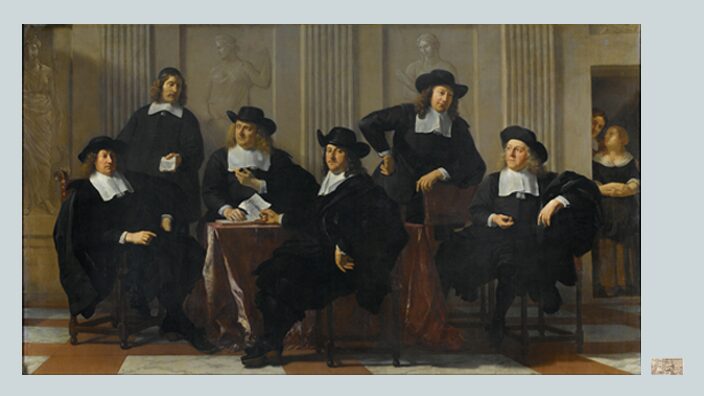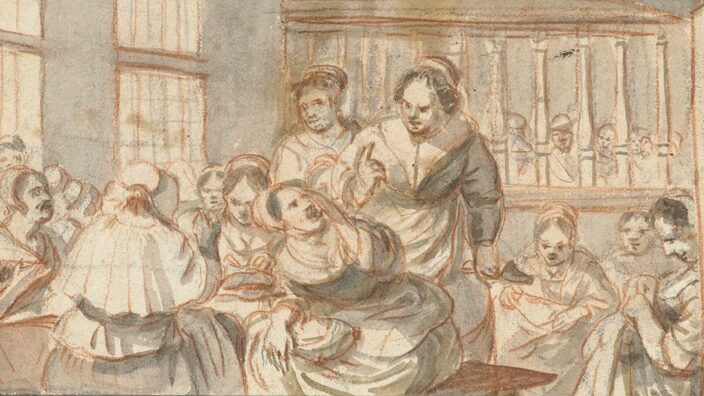Combatting Bias: Working Fairly with Historical Data
| Duration: | 2024 - 2025 |
| Subsidy provider: | NWO (through the TDCC-SSH) |
| Subsidy size: | €150,000 |
The Combatting Bias project explored how scientists, heritage institutions and archives can work more fairly and inclusively with historical data. The team developed a toolkit, glossary and guidelines, all available online to support researchers in conducting bias-aware historical research.
What is Bias? Two Pictures from The Spinhuis
The Huygens Institute is housed in The Spinhuis, a 17th-century workhouse for convicted women: thieves, sex workers, perpetrators of violence and swindlers. They were forced to spin and sew, hence the name ‘Spinhuis’ (spinning house).
Few images of The Spinhuis survive from the 17th century. One is a metres-high oil painting from 1669 depicting the regents of The Spinhuis, a small group of men whose names are known. Another is a tiny chalk drawing from 1638, showing a large group of nameless women serving their sentences. These women are not mentioned in the title or description.
Which gives a more accurate representation of the 17th century goings-on in The Spinhuis? The select gentlemen’s club, dressed in the tailored suits of their time, depicted full-length in an expensive group portrait? Or the many women imprisoned there, each with their own name and life story, shown anonymously in a hurried sketch on a scrap of paper?
Automatically choosing the gentlemen: this is bias, a skewed story. Just as skewed as the difference between a gigantic oil painting and a postcard-sized drawing.

Images from the Spinhuis. Left: The regents of the Spinhuis and Nieuwe Werkhuis in Amsterdam (1669), 225×390 cm. Right: Spinhuis in Amsterdam (1638), 10×21 cm.
Goals of the Project
Many researchers work with digital datasets: collections of figures, texts, maps and images. Combatting Bias focused on tackling biased or skewed/one-sided narratives in historical datasets. These narratives often present only the perspectives of powerful individuals and groups, such as the regents of The Spinhuis. Other groups, including women, workers and colonial victims, are frequently omitted. This results in an incomplete and unfair representation of the past.
Combatting Bias developed a Bias Aware Framework to counteract this bias. The framework builds on principles that emphasise responsible, inclusive and open research, such as data justice and the FAIR Principles (findable, accessible, interoperable, reusable). The Bias Aware Framework translates these ideas into practice: clear guidelines to address inequalities in datasets and research.
Bias Aware Framework: an Extra Dimension
Applying Bias Awareness makes datasets more fair and inclusive. Researchers, heritage institutions and archives can apply Bias Awareness to identify hidden bias and check whether they might unintentionally introduce their own bias. Awareness leads to a more nuanced and just understanding of the past.
This is also important for the general public. Bias Awareness enriches history by ensuring that certain people, groups and events are no longer overlooked or misrepresented. Stereotypes and inequality are less likely to persist. Since fair and inclusive datasets are picked up by search engines and AI, Bias Awareness helps ensure knowledge is more accessible, equitable and inclusive across society at large.
Tools for Combatting Bias
Bias Glossary: a shared language for discussing bias.
Bias-Aare Data Lifecycle Model: helps researchers reflect and adjust their methods.
Practical Guidelines: support the identification, description and prevention of bias.
International Collaboration
Ten specialist advisors from the Netherlands, South Africa and the US, experts in digital heritage, decolonisation and diversity and inclusion, collaborated on the project. Combatting Bias also partnered with four major projects on colonialism and slavery:
- Slave Voyages – database on the transatlantic and intra-American slave trade
- HDSC – records of enslaved people in the Dutch colonies
- ESTA – research on the slave trade in the Indian Ocean and Maritime Asia
- GLOBALISE – digital infrastructure for VOC archives
The Gains of Combatting Bias
Combatting Bias marks an important step towards fairer and more inclusive historical research. The Bias Aware Framework guides researchers in compiling datasets critically and ethically, creating a more complete and just representation of the past that includes previously overlooked stories and perspectives.
Explore the Combatting Bias toolkit, glossary and guidelines online.

